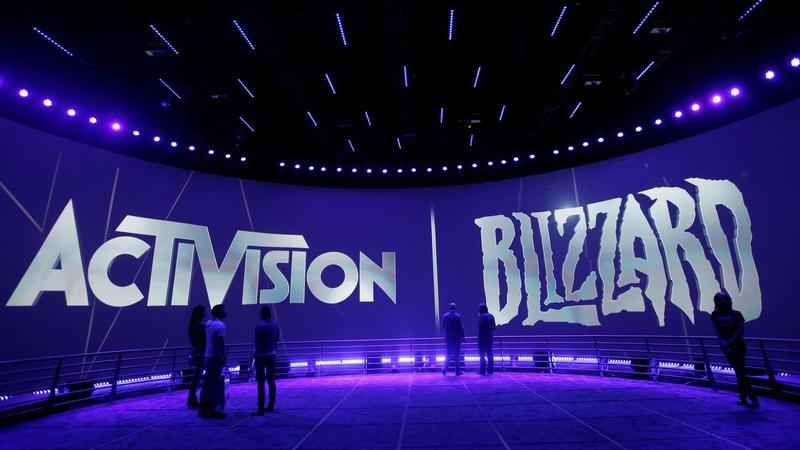Microsoft buys Activision Blizzard for $68.7 billion

The Activision Blizzard Booth is shown on June 13, 2013 the during the Electronic Entertainment Expo in Los Angeles. Microsoft is buying Activision Blizzard, Tuesday, Jan. 18, 2022, for $68.7 billion to gain access to blockbuster games including Call of Duty and Candy Crush. The all-cash deal will let Microsoft accelerate mobile gaming and provide it building blocks for the metaverse, or a virtual environment.[AP Photo/Jae C. Hong, File]
Microsoft is paying nearly $70 billion for Activision Blizzard, the maker of Candy Crush and Call of Duty, as it seeks an edge in the fiercely competitive businesses of mobile gaming and virtual-reality technology.
The all-cash $68.7 billion deal will turn Microsoft, maker of the Xbox gaming system, into one of the world’s largest video game companies and help it compete with tech rivals such as Meta, formerly Facebook, in creating immersive virtual worlds for both work and play.
If the deal survives scrutiny from U.S. and European regulators in the coming months, it also could be one of the biggest tech acquisitions in history. Dell bought data-storage company EMC in 2016 for around $60 billion.
Activision has been buffeted for months by allegations of misconduct and unequal pay, and that was addressed Tuesday by Microsoft CEO Satya Nadella in a conference call with investors.
“The culture of our organization is my number one priority,” Nadella said, adding that ”it’s critical for Activision Blizzard to drive forward on its” commitments to improve its workplace culture.
Activision disclosed last year it was being investigated by the Securities and Exchange Commission over complaints of workplace discrimination. That was after California sued the Santa Monica-based company in July, citing a “frat boy” culture that had become “a breeding ground for harassment and discrimination against women.”
Activision CEO Bobby Kotick will retain his role, and he and his team will maintain their focus on driving efforts to further strengthen the company’s culture and accelerate business growth.
Wall Street saw the acquisition as a big win for Activision Blizzard Inc. and shares soared 27% in early trading Tuesday, making up for losses over the past six months since California’s discrimination lawsuit was filed. Shares of Microsoft slipped less than 1%.
Last year, Microsoft spent $7.5 billion to acquire ZeniMax Media, the parent company of video game publisher Bethesda Softworks, which is behind popular video games The Elder Scrolls, Doom and Fallout. The Redmond, Washington, tech giant said both acquisitions will help beef up its Xbox Game Pass game subscription service while also accelerating its ambitions for the metaverse, a collection of virtual worlds designed as a next generation of the internet.
The acquisition also pushes Microsoft past Nintendo as the third-largest video game company by global revenue, behind Playstation-maker Sony and Chinese tech giant Tencent, according to Wedbush Securities analyst Daniel Ives.
“Microsoft needed to do an aggressive deal given their streaming ambitions and metaverse strategy,” Ives said. ”They’re the only game in town that can do a deal of this size with the other tech stalwarts under massive tech scrutiny."
Meta, Google, Amazon and Apple have all attracted increasing scrutiny from antitrust regulators in the U.S. and Europe, but the Activision deal is so big that it will also likely put Microsoft into the regulatory spotlight, Ives said.
Microsoft is able to make such a big all-cash purchase because of its success as a cloud computing provider. But after years of focusing on shoring up its business clients and products such as the Office suite of email and other work tools, Ives said Microsoft’s failed 2020 attempt to acquire social media platform TikTok may have “really whet the appetite for Nadella to do a big consumer acquisition.”
Pushback against the deal was immediate from consumer advocacy groups.
“No way should the Federal Trade Commission and the U.S. Department of Justice permit this merger to proceed,” said a statement from Alex Harman, competition policy advocate for Public Citizen. “If Microsoft wants to bet on the ‘metaverse,’ it should invest in new technology, not swallow up a competitor.”
Started in 1979 by former Atari Inc. employees, Activision has created or acquired many of the most popular video games, from “Pitfall” in the 1980s to “Guitar Hero” and the “World of Warcraft” franchise. Kotick has been CEO since 1991.
Microsoft said it expects the deal to close in the upcoming 2023 fiscal year, which starts in July. The Activision business unit would then report to Phil Spencer, who has led Microsoft’s Xbox division and will now serve as CEO of Microsoft Gaming.